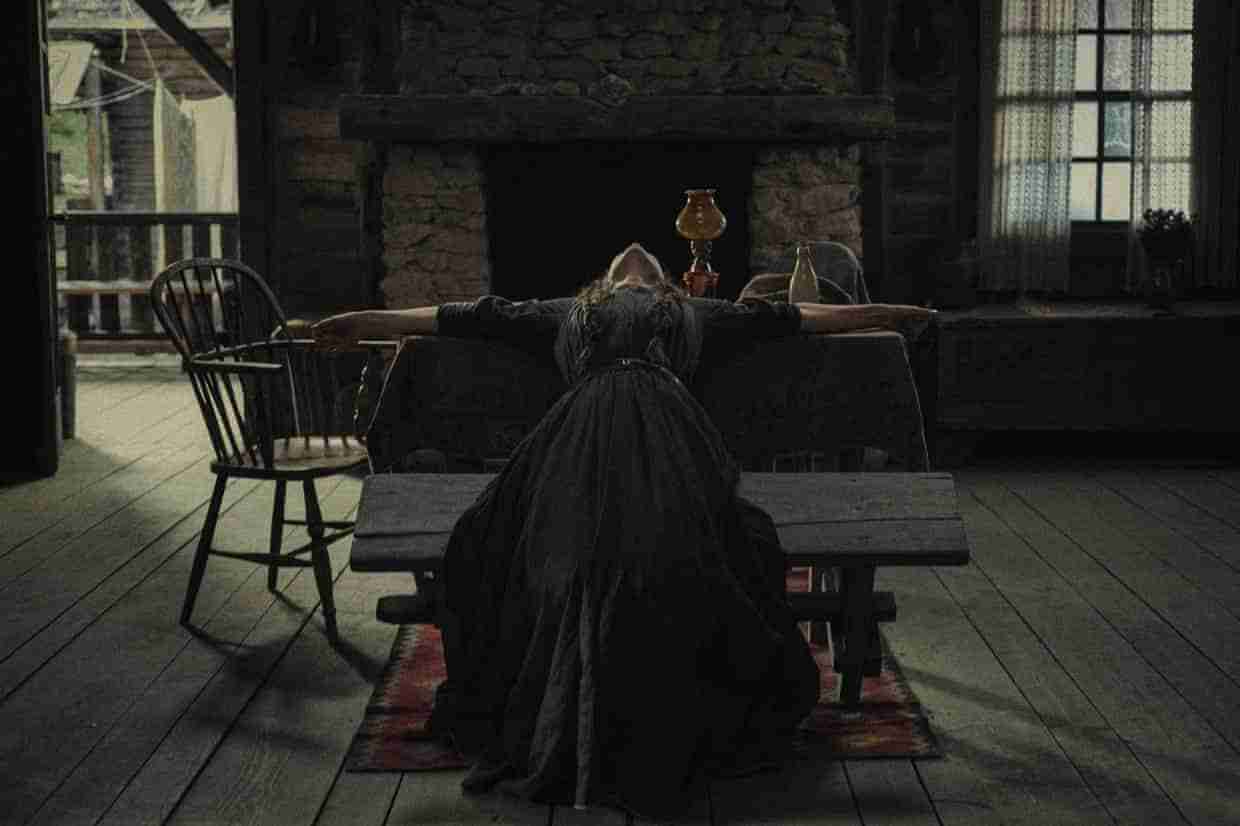Directed by Mona Fastvold. Screenplay by Ron Hansen & Jim Shepard. Starring Katherine Waterston, Vanessa Kirby, Casey Affleck & Christopher Abbott.
Spoiler alert
This film should have a health warning for anyone living in a colder climate. Set on the East Coast of the USA in the mid-19th century, The World To Come is an unabashed frontier romance. The main problem with the frontier (the absence of Netflix aside) is that, in winter, it’s fucking freezing. The film evokes the snowstorms and lack of electricity so affectively that you’ll be shivering five minutes in. Don an extra pair of long johns to get through this without frostbite (apologies in advance to your girlfriend).
The story is quietly narrated by Abigail (Katherine Waterston), a stoic and reserved farmer’s wife who plays the role of housewife and cow-milker without complaint. Her husband, Dyer (Casey Affleck), is equally low-key. Honestly, if it wasn’t for the narration the beginning of this film would have zero dialogue.
It appears, at first, to be a loveless marriage. They both have their daily routines, isolated from each other. Thinly veiled metaphors (“there’s ice in our bedroom”) suggest a distinct lack of of any physical relationship. However, as with all good stories, it’s a bit more complicated than that. Brief flashbacks show us a once joyful relationship and put into context a present that is still reeling from a life-changing loss. They haven’t quite found their way back to each other or themselves just yet.
This grief filled and mundane world (we’re not being harsh, she ate a plain baked potato for dinner) is interrupted by Tally (Vanessa Kirby), a woman so brimming with flirtation that she’s perpetually on the verge of an arched eyebrow. Tally is that rare and magical creature: a lesbian forward enough to make the first move. Even though she rolls into town sitting next to her bully of a husband, Finney (Christopher Abbott), she quickly makes a beeline for Abigail, walking over the hill with her shaggy dog to make an introduction.
As the women embark on the beginnings of a friendship the snow around them begins to thaw. Though any sort of romance would have been strictly forbidden in the 19th century, as it still is in the 21st is so many corners of the world, there is a clear and immediate connection between them. What begins as a cautious conversation around a kitchen table soon develops into a deep and committed intimacy. Tally makes her daily pilgrimage to Abigail and finds a place of safety and authenticity for them both.
Abigail’s world seems larger again, more full of possibility. She even asks Dyer if she can buy an atlas, suddenly curious about a world beyond. Their first kiss brings with it the first moment of complete abandon that we see from Abigail. A woman usually so restrained finally gets out of her own head. “Astonishment and joy” she repeats to herself as she melts back on to the kitchen table.

How lovely it would have been if The World To Come had ended then. A short film about two women who, against all odds, build a life for themselves on the American frontier. They knit chunky jumpers, adopt dogs and read each other poetry. Well, we do get a bit of poetry from Tally but that’s where that dream ends. Enter the jealous spouse.
You may remember Christopher Abbott for his brilliant turn as Marnie’s meek boyfriend Charlie in Lena Dunham’s Girls. Finney is nothing like Charlie. Hugely possessive of Tally, he begins to resent her relationship with Abigail and, as Abigail begins to forget her duties around the farm, Dyer starts to lose patience too. Why they couldn’t bake their own fucking potatoes is beyond us. Soon enough the women are unceremoniously split up. Finney ups stick and moves him and Tally out of town without so much as a word.
Just when you thought San Junipero had changed the game and LGBTQ+ films could have a happy ending, The World To Come falls prey to the classic 90s lesbian trope. There’s a lot of angst, forbidden love, a moment of happiness and then one of them dies. The final scene does bring some small joy found in the solace of fantasy and memory but it’s fair to say that the end of the film is heartbreaking. But then being gay in the 1850s probably was. Perhaps Abigail and Tally were born 150 years too early. If they were on the East Coast today maybe they’d have those dogs and all that chunky knitwear.
During the press rounds Vanessa Kirby spoke of feeling like the film’s title was a nod to a brighter future, for women especially. Certainly, a lot of women today have more freedom and opportunity than Tally or Abigail ever would have enjoyed, though not all do. But, even in the face of that oppression, Abigail and Tally went against convention in the name of love. To try to forge a life together, in the hardest of circumstances, but in the hope of a better world to come.
Don’t get us wrong – the film is a good’un. Full of tension and fizzing chemistry between the two leads. Call us old romantics here at Nonchalant but a happy ending would have been nice. Though, if we can’t have a happen ending, then a hopeful one will do just fine.
Love,
Team Nonchalant x
PS If you’re looking for some other movie options check out our list of the best lesbian films on Netflix and Amazon Prime
PPS Any other films that you thought were perfect but wished for a happier ending? Drop us a comment below with your picks


